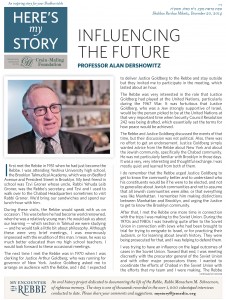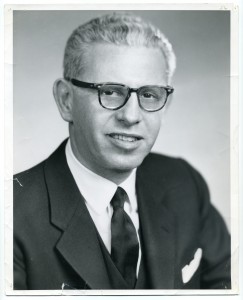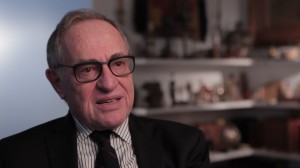HMS: Influencing the future
I first met the Rebbe in 1951 when he had just become the Rebbe. I was attending Yeshiva University high school, the Brooklyn Talmudical Academy, which was on Bedford Avenue and President Street in Brooklyn. My best friend in school was Tzvi Groner whose uncle, Rabbi Yehuda Leib Groner, was the Rebbe’s secretary, and Tzvi and I used to walk over to the Chabad Headquarters sometimes to visit Rabbi Groner. We’d bring our sandwiches and spend our lunch-hour with him.
During these visits, the Rebbe would speak with us on occasion. This was before he had become world renowned, when he was a relatively young man. He would ask us about our learning – which section in Talmud we were studying – and he would talk a little bit about philosophy. Although these were very brief meetings, I was enormously impressed with the erudition of this man. I mean, he was so much better educated than my high school teachers. I would look forward to these occasional meetings.
The next time I met the Rebbe was in 1970 when I was clerking for Justice Arthur Goldberg, who was running for governor of New York. Justice Goldberg asked me to arrange an audience with the Rebbe, and I did. I expected to deliver Justice Goldberg to the Rebbe and stay outside but they invited me to participate in the meeting, which lasted about an hour.
The Rebbe was very interested in the role that Justice Goldberg had played at the United Nations, particularly during the 1967 War. It was fortuitous that Justice Goldberg, who was a Jew strongly supportive of Israel, would be the person picked to be at the United Nations at that very important time when Security Council Resolution 242 was being drafted, which essentially set the terms for how peace would be achieved.
The Rebbe and Justice Goldberg discussed the events of that time, but their discussion was not political. Also, there was no effort to get an endorsement. Justice Goldberg simply wanted advice from the Rebbe about New York and about the Jewish community, specifically the Chabad community. He was not particularly familiar with Brooklyn in those days. It was a very, very interesting and thoughtful exchange. I was mostly quiet and learned from both of them.I do remember that the Rebbe urged Justice Goldberg to get to know the community better and to understand who his constituents would be if he were to be elected, and not to generalize about Jewish communities and not to assume that all Jewish communities were alike, or that everything was like Manhattan. I remember him making distinctions between Manhattan and Brooklyn, and urging the Justice to get to know the Brooklyn community.
After that, I met the Rebbe one more time in connection with the trips I was making to the Soviet Union. During the 1970s and 1980s I was traveling quite often to the Soviet Union in connection with Jews who had been brought to trial for trying to emigrate to Israel, or for practicing their Judaism, or for learning about Jewish history. They were being prosecuted for that, and I was helping to defend them.
I was trying to have an influence on the legal outcomes of cases in the Soviet Union. Toward that end, I was meeting discreetly with the procurator general of the Soviet Union and with other major prosecutors there. I wanted to coordinate the efforts of Chabad in the Soviet Union with the efforts that my team and I were making. The Rebbe commended me for what I was doing because I was doing it quietly, behind the scenes – which he felt was the best way to affect change – and he gave his blessing to our legal efforts on behalf of Soviet Jewry.
I did not have much occasion to meet with him again after that, but we did have an exchange of letters a couple of times, including one that involved Senator Jesse Helms.
I was involved in civil rights and human rights, and I considered Senator Helms to be the enemy of civil rights and civil liberties. He stood against everything that I stood for, and against what many of my friends and colleagues stood for. In 1984, when I heard that Senator Helms was being honored by Chabad at a reception in Washington in honor of ‘Education Day’, I was surprised and disappointed. I wrote a very polite letter to the Rebbe, respectfully asking why he chose to honor a man who was against integration, against gay rights, women’s rights, equality for all.
The Rebbe replied with a very poignant and powerful letter. He explained that Senator Helms was not being honored, but was simply one of many US Senators and US Representatives who came to the “Education Day, USA” reception.
Then Rebbe wrote a long and beautiful P.S., explaining how one influences other human beings. All people – but especially politicians, who often act out of expediency more than conviction – should be engaged in a positive way. That way, we can try to influence them. He said I should watch carefully to see whether or not we have had an influence on Jesse Helms.
Sure enough, very shortly after he was honored, Senator Helms assumed a very influential role on the United States Senate Foreign Relations Committee and became one of the strongest supporters of Israel and of other Jewish causes as well. So obviously the Rebbe had had an enormous influence on persuading Jesse Helms that, even with his very conservative values, he could become a beacon for the Jewish state.
This showed me how the Rebbe’s influence transcended Brooklyn, and even the Jewish community. Here, he was able to influence the conduct of a Southern Christian who had a love for Israel but it was somehow buried. But the Rebbe was able to bring it out, and Senator Helms was able to use his own Christian background to recognize the need to be supportive of Israel. It really showed how far the Rebbe’s influence reached beyond his own community.
His death in 1994 was devastating to everybody in the world and it caused worry among some people if there would be a contest over who would succeed him. Who could ever succeed this Rebbe? I mean, he was such a giant, it would be so difficult to find somebody to replace him.
But he was an incredibly foresighted, insightful leader who essentially laid a foundation for his demise and made sure that the work of Chabad would continue. And it has indeed. If anything its scope around the world has increased.
I can tell you this from personal experience: When Rabbi Hirschy Zarchi first came up with this harebrained idea of having a Chabad House at Harvard University, many thought that it couldn’t possibly work. Harvard is the center of intellectualism, and I thought Chabad is more emotional and psychological and spiritual – it would be a mismatch.
But as soon as I talked with Rabbi Zarchi, I knew it wasn’t going to be a mismatch. In fact, today we can say that after 350 years of Harvard’s existence, we’re finally getting Chochma, Binah and Daat – Wisdom, Understanding, and Knowledge and let me tell you, we’ve never needed it more.
Rabbi Zarchi put his finger on what was missing at Harvard – soul, neshama. At a place like Harvard, we have plenty of brainpower. Brains here are a dime a dozen. It’s character that’s often lacking – a sense of mission and transcendence, of understanding that your abilities have to transcend your own selfishness. And, following the teachings of the Rebbe, Rabbi Zarchi really managed to bring a soul to the Harvard community.
Alan Dershowitz, an American lawyer, author, and political commentator, is a professor of law at Harvard University since 1967 and is faculty advisor to Chabad at Harvard. He was interviewed in Manhattan in May of 2014.
This week’s Here’s My Story is generously dedicated








No Comments to “HMS: Influencing the future”